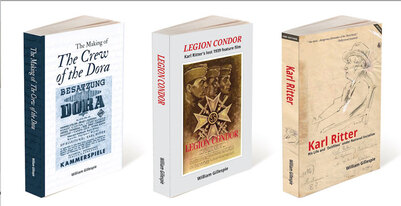- Home
- POSTER GALLERY
- ❗️BOOK & POSTER STORE❗️
- PURCHASE "HJ Quex" film ephemera HQ
- About the Posters
- The William Gillespie Collection
- Our Publishing House
- ❗️GFDN interviews author and collector William Gillespie ❗️
- Our most expensive & inexpensive finds!
- ❗️***NEW!**❗️POSTER OF THE MONTH - Blutzeugen / Raza
- ❗️NEW ❗️Film Posters – Demands on an important means of film advertising. ❗️
- In our Book + Zeitschrift Library
- ❗️ ***NEW!*** Hitler Youth Quex – A Guide for the English–speaking Reader ***NEW!*** ❗️
- ❗️***NEW!*** Table of Contents of our new HJ QUEX book❗️
- ❗️Hitler Youth Quex Guide - early praise! ❗️
- Recent loans from the Collection
- Farewell Horst Claus. (1940–2024 †)
- "Der Deutsche Film" Zeitschrift
- ❗️ ***NEW!***Reichsfilmkammer collection ❗️
- German "Tendency" Films (Tendenzfilme) in the Third Reich
- KARL RITTER
- Karl Ritter original film posers in this Collection
- "Besatzung Dora" ( † 1943)
- "The Making of The Crew of the Dora"
- Karl Ritter at the 1938 Reichsfilmkammer Congress
- INDEX -"Karl Ritter" book, 2nd edition
- Karl Ritter's Legion Condor (1939, unfinished)
- Excerpt from our "Dora" book
- ∆∆∆∆∆ High praise for our DORA book! ∆∆∆∆∆
- TABLE OF CONTENTS – "Legion Condor"
- § § § § § Early Praise for our LEGION CONDOR book! § § § § §
- ❗️"Das Leben geht weiter" and Karl Ritter ❗️
- Dateline: Ufa - April 11, 1945
- Zarah Leander Europe–wide !
- Japan Military Film and Karl Ritter
- Karl Ritter after 1945
- 1935 Film Congress
- Poster Exhibition in Berlin, March 1939
- Potsdam poster exhibition 12 April–25 August 2019
- Leni Riefenstahl's two "Olympia" Films (1938)
- "Ohm Krüger" (1941)
- Emil Jannings
- "Blutendes Deutschland" (1933)
- Hannes Stelzer ( † 1944)
- Klaus Detlef Sierck ( † 1944)
- Film stills
- Reich Film Censorship Offices
- ❗️***NEW!***The Fate of the German Film Industry in May 1945 ❗️
- Film censorship cards
- Film Archives
- Cinema advertising
- School filmstrips
- ❗️UPDATED❗️ Z F O / Ostland Film G-m-b-H
- Z F O / Herbert Jacobi estate
- ZFO / Ostland Film newspaper articles
- ❗️***NEW!*** Roter Nebel / Red Fog / Red Mist (1942/1943, ZFO) ❗️
- ZFO - Der Rückkehrer - The Returnee (1943/1944)
- The D F G production company
- D I F U
- ❗️ ***NEW!*** "Carl Peters" – Special Collection. ❗️
- "Alcazar" (1940, Genina)
- "Der 5. Juni" (1943, banned)
- Herbert Selpin and his "Titanic" (1943)
- Ein Robinson (1940, Fanck)
- "Fronttheater" (1942)
- Veit Harlan's Jud Süß and Fritz Hippler's Der Ewige Jude
- Harlan "Jud Süß" trial 1949
- Werner Krauss & JUD SÜß
- Anti-Semitic Film Posters in the Collection
- "Heimkehr" (1941)
- "Hitlerjunge Quex" (1933)
- ❗️***NEW!*** Hitlerjunge Quex in 111 Greater Berlin Cinemas ❗️
- Jürgen Ohlsen
- "S.A.Mann Brand" (1933)
- "In der roten Hölle" (Edgar Neville, 1939)
- "Helden in Spanien" (1938)
- The Spanish Civil War in Film
- Andrews Engelmann (1901 – 1992)
- Deutsche Wochenschau
- Uƒa Feldpost
- Uƒa Kulturfilm – Informationen
- " Die Tochter des Samurai" (1937, Fanck)
- Ufa 25th Anniversary
- Invitations to world premieres
- ❗️***NEW!*** Continental Films, Paris 1940–1944 ❗️
- Film Censorship in Occupied Paris 1942
- "Der Sieg des Glaubens" (1933)
- Wilhelm Althaus Estate
- Weimar Germany posters
- Ufa and the Ordensburgen
- The Gaufilmstelle in our Collection
- "Zwei Welten" (1940)
- "Capriccio" (1938) –Karl Ritter film album
- Unrealised NS Propaganda Films 1934–1945
- German Film Directors accused of "war crimes"
- Australian––themed NS feature films
- "Der Störenfried" / "The Troublemaker"
- What was new in 2014?
- What was new in 2015?
- What was new in 2016?
- What was new in 2017?
- What was new in 2018?
- What was new in 2019?
- What was new in 2020?
- What was new in 2021?
- What was new in 2022?
- What was new in 2023 ?
- What's new in 2024?
- ❗️***NEW!*** Hitler assassination attempt in Karl Ritter film cut❗️
- BESATZUNG DORA private photos
- Just discovered 1942 article on BESATZUNG DORA
- The Karl Ritter Tetralogy
- Google Analytics 2023
- Our first–ever acquisition!
- ❤️"Some of our favourite things....!"❤️
- ERRATUM for our " Hitler Youth Quex Guide"
- Trending
- Vale †
- Our Wants List / 2024 / Wunschliste
- Pop Quiz
- Unsere KARL RITTER Bücher in Deutschland liefbar!
- WHERE to buy our books right now?
- ✉️Contact
 “History is not about the facts. It is about the context and who is telling the story.” —Prof. Milton Fine.
“History is not about the facts. It is about the context and who is telling the story.” —Prof. Milton Fine.
"Who controls the past controls the future: who controls the present controls the past." –– George Orwell in his novel "1984."
"Whoever doubts the exclusive guilt of Germany for the Second World War destroys the foundation of post–war politics." –– Prof. Theodor Eschenberg, Rector, the University of Tübingen.
"If we have our own why in life, we shall get along with almost any how." – Friedrich Nietzsche
POSTER GALLERY --view
over 500 German film
original posters between
1927–1954 from
Germany and from
many Axis and Neutral countries
across Europe!
Note! Posters in the Poster Gallery are PERMANENT
acquisitions which are NOT FOR SALE!! ONLY the
posters listed in our POSTER STORE are for sale.
(They have a price and order button to use.)
"The drought of research on filmmakers from the period 1933-45 has had its only fertile area in a place not exactly close to Germanic lands such as Sydney, Australia, where William Gillespie—a researcher with no previous resume in cinematographic themes, at least as far as I know—has been reviewing the work of a filmmaker who was one of the heavyweights of Nazi cinema but whose name, very probably, it will not sound familiar to anyone who has not studied that era a little: Karl Ritter (1888-1977). "
----FILM-HISTORICA, University of Barcelona, Spain, 31 October 2023 journal article
The Karl Ritter Tetralogy of books
The books:
* Karl Ritter - His Life and 'Zeitfilms' under National Socalism (2014)
* The Making of The Crew of the Dora (2016)
* Legion Condor – Karl Ritter's lost 1939 feature film (2019)
* Hitler Youth Quex – A Guide for the English–speaking Reader (2022)
provide the student or reader of Third Reich cinema an unparalleled insight into propaganda film–making in these years.
Karl Ritter was the only film director from this era who kept a daily diary and added to it snapshots, telegrams and other ephemera to document his work in the German film industry from his Weimar Era days in silent film through to the end of WWII and beyond. His diaries spanned 1911 to 1977.
Privileged access to the diaries, held by his family in Argentina, allowed author William Gillespie to write the biography, and then the three subsequent books on the banned Luftwaffe film Besatzung Dora, the cancelled film Legion Condor and on the 1933 classic Hitlerjunge Quex. All four book draw on the diaries and private photographs, and Ritter's own words to tell these amazing stories. We also, of course, drew on our vast collection of hundreds of film books and original Ufa publications and film stills and posters to find detailed information on Karl Ritter and his films for these books. Research on the Ritter biography took five years alone.
Karl Ritter has thereby gone from being comprehensively shunned, ignored, dismissed and despised in post-war German film history, to someone with much more first–hand information and primary source material published than was even imaginable a decade ago. Post–war German film historians are by and large trapped in a Weimar Cinema parallel universe, a sad cul–de–sac focusing on silent films which bankrupted the Ufa studio and caused the decline and fall of other major German studios such as Südfilm and Emelka Film in the early 1930s. A handful of these films pioneered early motion picture development and evolution but were, even before the transition to sound film, already passé. (Their bankruptcies allowed the USA to buy up most of the German film industry for pennies on the dollar and to make sure that it was crippled; so that Hollywood films could predominate thereafter.) One could argue that the last Weimar era style film was in fact Hitlerjunge Quex, directed by Hans Steinhoff and produced by Ritter in 1933.
The first three Ritter books have been praised by scholars and German film historians in the UK, USA, Germany, Belgium and Austria for their 'meticulous research' and for their unearthing of new information. The newest book on the film Hitler Youth Quex, has received outstanding reviews. At the same time, some German and English language reviews of Gillespie's Karl Ritter books have criticised them for not taking a stand on Ritter or his films, or for not 'constructing his own interpretative narrative.'
'He counts upon the historic evidence and has it speak for itself rather than interpreting it. Regarding the topic and period of the book, this might cause some readers irritation due to the author’s lack of taking a clear position against his subject....' [ Yes, AGAINST HIS SUBJECT.]
-and-
'As in the case of the previous volumes, the LEGION CONDOR monograph may be accused of lacking an analytical approach, since it is primarily aimed at lovers and specialists who appreciate Gillespie's meticulous research.'
The main issue about such a narrative is that scholarly journals demand that such post–war film critiques universally look through the prism of Eisenstein / Kracauer / Adorno / Benjamin / Marcuse / Freud /Derrida marxist constructs and dialectics; and view all Third Reich films through such an intrinsically hostile and ideological lens. It in a way continues the political battle between National Socialism and Marxism by the written word.
After all, these philosophers and critics were far from neutral – –– Eisenstein's 1929 Soviet film The Old and the New/The General Line implicitly endorsed the mass murder –– the extermination –– of a million Kulaks through Trotski's Red Army terror and its calculated slow starvation (but unlike Riefenstahl, he is still taught to wide-eyed film students in western countries today); refugee Siegfried Kracauer reputedly never saw some of the NS films he critiqued in his From Caligari to Hitler, Theodor Adorno was a bigoted marxist who, for example, loathed African–American music and said that 'totalitarianism and homosexuality go together.' Marcuse was hailed as 'the father of the New Left.' Derrida called his theory of reconstruction 'a radicalization of a certain spirit of Marxism.' Walter Benjamin's sister-in-law was the notorious "Red Hilde" Benjamin, who was a Communist lawyer in Weimar Germany and later was appointed by Moscow as the first Minister of Justice [sic!] of the criminal East German government, notorious for many "show trials" of that regime. All of these gentlemen would have had to have run for their lives after 1933 from Germany – some did so -- so how could they possibly ever be seen as objective about any film made in Germany between 1933 and 1945? Would we accept without question a Nazi film critic's reviews of Hollywood pictures today?
Gillespie, provided unprecedented access to Ritter's private diaries, has unearthed many overlooked and unknown facts, discovered a lost film script, and published a huge number of private and heretofore unseen photographs and documents which provide the reader of his three books the basis on which to make up their own minds. The contemporary 'Zeitfilms' written, and directed and produced by Karl Ritter were a product of their times, and should be seen within that historical context. Post-war modern Marxist film theory, often laced with other side issues such as feminism, cannot provide the unbiased history inherently due to every reader. For post–war film historians to bring such bias to their writings is an abdication of duty and an unfortunate feature of German film historiography.
IN SUMMARY :
These four Karl Ritter books have been written using unprecedented access to over one thousand pages of Ritter's private unpublished diary pages between 1925 and 1945 and combined; total:
-
1,238 pages
-
900 footnotes
-
251 B&W photographs, maps, sketches (many previously unknown)
-
28 full colour full-page plates
-
extensive Bibliographies


